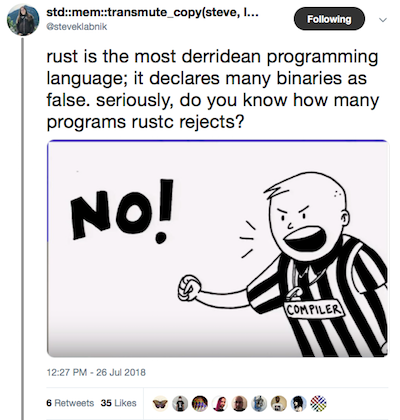Summer School With The Rust Compiler
A few months ago, I saw this tweet from Steve. I'm not even sure what "derridean" means, but now the image of an insane coach pops into my head every time I try to write Rust code.
Learning Rust is hard for everyone, but it’s even worse for me because I’ve been working with Ruby during past ten years. Switching to Rust from Ruby is leaving an anything-goes hippie commune to a summer school for delinquent programmers run by a sadistic and unforgiving teacher.
Why would anyone use a compiler like this? The answer is simple: to learn how to write better code. This past summer I had some free time and decided to convert a simple Ruby script into Rust. As you’ll see, the Rust compiler beat me up a few times; it wasn’t easy. But after some tough love I ended up learning something, not only about Rust but about Ruby too.
Iterating Over an Array in Ruby
Here’s my example program. It’s so short and simple you can read and understand it in just a few seconds:
array = [1, 2, 3] for i in array puts i end
When I ran it, the output was:
$ ruby int-loop.rb 1 2 3
Ruby’s syntax and feature set are designed to make my life easier as a developer. Writing Ruby for me is as natural as writing English; it’s like having a pleasant conversation with my computer. I’m living in the Garden of Earthly Delights. If I can imagine a code change, I can write it. Using Ruby, all of my dreams can come true.
Next I decided to increment the values before printing them out. I added just one line of code to my example, i = i+1:
array = [1, 2, 3] for i in array i = i+1 puts i end
As I expected, Ruby printed out 2 through 4:
$ ruby int-loop.rb 2 3 4
Of course, there are other ways to produce the same result. I could have used puts i+1, or mapped the original array to a new array [2, 3, 4]. But Ruby doesn’t care. Today I felt like writing i = i+1, and Ruby let me do it without comment. Ruby is the parent of an unruly teenager that gets away with anything.
As I found out later, using i = i+1 might have broken a Computer Science rule or two, but I was blissfully unaware. What you don’t know can’t hurt you. Ruby didn’t tell me anything might be wrong… but as we’ll see Rust certainly did!
Rust: Similar to Ruby At First Glance
I was curious: What would the Rust compiler think of this example? I was able to rewrite it in only a few minutes:
fn main() { let array = [1, 2, 3]; for i in array.iter() { println!("{}", i); } }
I had to type semicolons after each line and use a main function. A bit more typing, but really this is exactly the same program. Running this, of course, produced the same result:
$ rustc int-loop.rs && ./int-loop 1 2 3
Then I decided to try using the same i = i+1 line from above:
fn main() { let array = [1, 2, 3]; for i in array.iter() { i = i+1; println!("{}", i); } }
Lesson One: Passing By Reference vs. Passing By Value
Compiling this, the Rust compiler hit me over the head with Computer Science!
$ rustc int-loop.rs && ./int-loop error[E0271]: type mismatch resolving `<&i32 as std::ops::Add>::Output == &i32` --> int-loop.rs:4:14 | 4 | i = i+1; | ^ expected i32, found &i32 | = note: expected type `i32` found type `&i32` error: aborting due to previous error For more information about this error, try `rustc --explain E0271`.
What in the world does this mean? I wrote a very simple line of code, and got a message straight out of type theory! The error type mismatch resolving `<&i32 as std::ops::Add>::Output == &i32` makes no sense to me at all.
I decided to take the compiler’s suggestion and run the explain command:
$ rustc --explain E0271
This is because of a type mismatch between the associated type of some
trait (e.g. `T::Bar`, where `T` implements `trait Quux { type Bar; }`)
and another type `U` that is required to be equal to `T::Bar`, but is not.
Examples follow.
The explain output continued for about two more pages, with examples that didn’t resemble my code at all. What is a trait? What is an associated type? I didn’t use any of these more advanced Rust concepts in my simple script. Maybe I needed a PhD. in Computer Science even to try to use Rust?
Eventually, I figured it out. The key lines from the error message were:
4 | i = i+1; | ^ expected i32, found &i32
Rust is telling me that iter() yielded references to integers, but my code expected an actual integer, not a reference to an integer. But what are references, exactly?
Running my code above, Ruby passed each integer from the array to my code as a simple value:
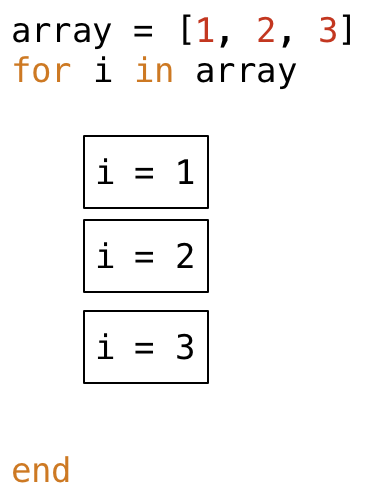
But Rust passed each integer from the array as a reference, or in other words as a pointer to the value itself:
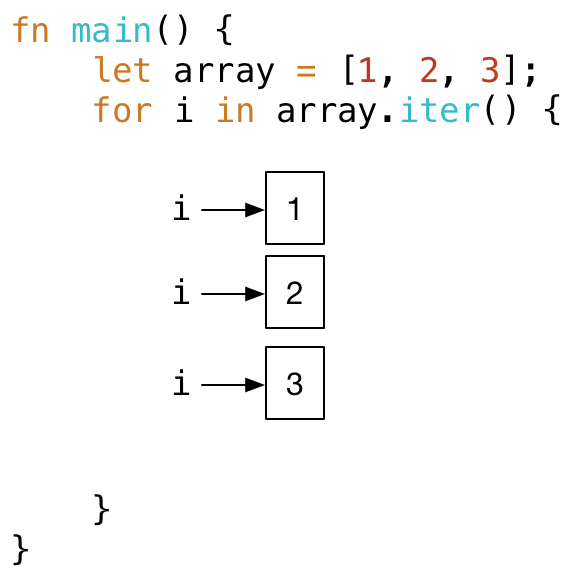
In Ruby, of course, I didn’t have to worry about references, pointers or even types, so none of this came up. Or at least that’s what I thought at the time.
Lesson Two: Borrowed Values
Ah - according to the Rust compiler’s error message I just had to dereference the reference before using it. I changed i = i+1 to *i = *i+1:
fn main() { let array = [1, 2, 3]; for i in array.iter() { *i = *i+1; println!("{}", i); } }
Then Rust slapped me in the face again with more Computer Science:
$ rustc int-loop.rs && ./int-loop error[E0594]: cannot assign to immutable borrowed content `*i` --> int-loop.rs:26:9 | 26 | *i = *i+1; | ^^^^^^^^^ cannot borrow as mutable error: aborting due to previous error For more information about this error, try `rustc --explain E0594`.
Ugh. I guess that was a bad idea. What in the world happened here? I thought I had the dereferencing syntax correct, *i, the same syntax I’m used to from C. Actually Rust didn’t complain about types any more or about using a reference vs. a value. But what does “borrow as mutable” mean? And why doesn’t Rust let me do that?
Again, the problem here is that I don’t know enough Rust even to understand the compiler’s error messages. I need to take a few months off from my day job and read a book, or take a class. I need to understand Rust’s ownership model.
In Rust, every value is “owned” by the spot in my code where I allocate that value. In this example, the integers and the array that contains them are owned by the main function. When the main function goes out of scope, Rust frees the memory for that array automatically. In this diagram, the red arrow shows where Rust allocates the array (at the top), and where Rust frees it (at the bottom):
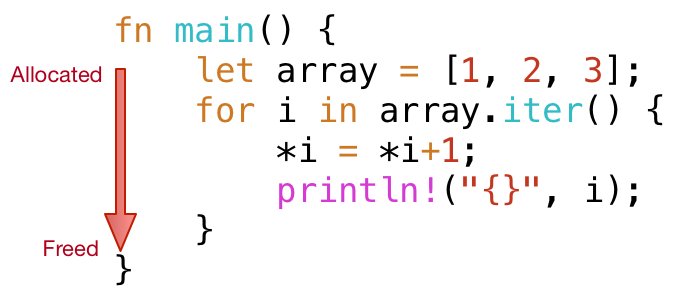
You can think of the red arrow as the “lifetime” of the array. When I pass a value from one spot to another, when I call a function or a closure, I can either “move” that value to the new function, or the function can ”borrow” it. In this example, the call to iter() borrowed the elements inside the array, passing a reference to each element into the closure. The blue array in this diagram indicates each element of the array, i, is a borrowed value inside the closure:
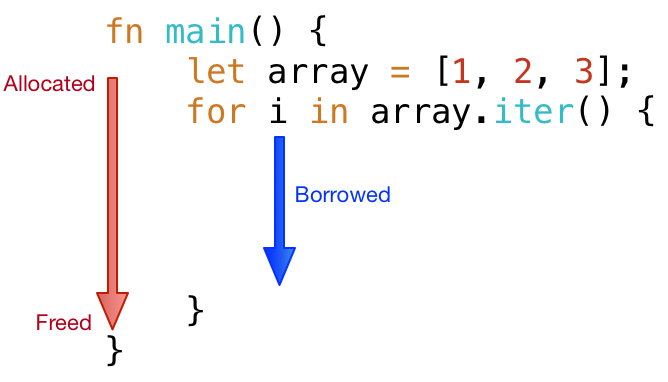
Lesson Three: Immutable vs. Mutable Values
But using borrowed values isn’t the problem here. The problem is that my code tries to change them, or mutate them:
*i = *i+1;
Because the value of i each time around the loop was an element of the array, and because iter() borrowed each element from the original array, the elements are marked as immutable, just as the array was. Or at least I that’s how I understood the previous error message.
Back in the main function when I typed:
let array = [1, 2, 3];
…Rust created an immutable array of three integers. All variables in Rust are immutable by default. Because it was immutable, my code can’t change it.
Ah… so the fix is to mark my array as mutable:
fn main() { let mut array = [1, 2, 3]; for i in array.iter() { *i = *i+1; println!("{}", i); } }
Lesson Four: Declaring Side Effects
Running the Rust compiler again, I got the same error along with a new warning:
$ rustc int-loop.rs && ./int-loop error[E0594]: cannot assign to immutable borrowed content `*i` --> int-loop.rs:14:9 | 14 | *i = *i+1; | ^^^^^^^^^ cannot borrow as mutable warning: variable does not need to be mutable --> int-loop.rs:12:9 | 12 | let mut array = [1, 2, 3]; | ----^^^^^ | | | help: remove this `mut` |
Wait - so now Rust was telling me I shouldn’t add the mut keyword? That my last change was dead wrong? Why was it wrong? Probably I didn’t understand what “cannot borrow as mutable” really meant.
It took me a while to figure this out but eventually I ran into this great article which explained what I was doing wrong and how to fix it. I needed to use iter_mut instead of iter. iter_mut yields mutable references to the closure, while iter yields normal, immutable references.
That is, by calling iter_mut I’m declaring that the code inside of the closure might mutate the elements of the array. This is knowns as a side effect. As a side effect of the iteration, the code inside might also change the values of the collection it is iterating over. Rust forced me to declare that my code might change the array.
Finally, running my program with iter_mut finally worked!
fn main() { let mut array = [1, 2, 3]; for i in array.iter_mut() { *i = *i+1; println!("{}", i); } }
$ rustc int-loop.rs && ./int-loop 2 3 4
What Rust Taught Me
My example today started out as a trivial, 4 line Ruby script. It was so simple, there really wasn’t anything that could possibly go wrong when I ran it. Then I added one simple line of code: i = i+1. When I added this to my Ruby script, it worked just fine.
As we saw, this line of code got the Rust compiler very angry. It slapped me in the face with four Computer Science lessons. I learned:
- about passing values vs. passing references.
- about mutable vs. immutable values.
- about value ownership, lifetimes and borrowing values.
- about side effects, and declaring them.
As you can see, the Rust compiler is an amazing tool you can use to learn more about Computer Science. The problem is that it’s hard to get along with. Compiling a Rust program will fail over and over again until you your code is 100% correct. You need to have tremendous patience to use Rust, especially as a beginner.
Worse than that, the Rust compiler’s error messages are hard to understand, and easy to misinterpret. They can seem to be self-contradictory as we saw above. The Rust compiler assumes you already know what it is trying to teach you. Not only is Rust a violent teacher, it’s a bad one. If I knew that iter() borrowed immutable values, if I knew what “borrowing” and “immutable” even meant, then I likely wouldn’t have run into that compiler error in the first place.
And Rust’s confusing error message lead me in the wrong direction. In this example, I didn’t really want to mutate the array, I just wanted to print out the incremented values. I could have just incremented an intermediate value and left the original array alone. Instead, the complex error messages confused and mislead me, and I never discovered this simpler code:
fn main() { let array = [1, 2, 3]; for i in array.iter() { println!("{}", i+1); } }
The Rust compiler is an amazing tool for learning; the problem is you need to have a deep understanding of the Rust language before you can use it effectively. Rust needs a --beginner option. Using this option on the command line would intstruct the compiler to produce error messages designed for Rust learners, rather than Rust experts.
What Ruby Didn’t Tell Me
I had the opposite experience using Ruby. No confusing compiler errors; in fact, no compiler at all. No types, no need to worry about immutability or whether I’m passing references or values. Everything just worked.
Or did it? Because Ruby passed integers by value, the array in my original example wasn’t modified:
array = [1, 2, 3] for i in array i = i+1 puts i end puts "----" p array
$ ruby int-loop.rb 2 3 4 ---- [1, 2, 3]
This is probably a good thing. Side effects like mutating a collection while iterating over it can easily lead to bugs. Maybe code later in my program needed the original, unchanged values in that array? Maybe another thread was trying to use that collection at the same time?
The problem with using Ruby is that you don’t know what Ruby isn’t telling you. Because Ruby didn’t display any warnings or error messages when I added i = i+1 to my loop, I didn’t even think about any of these issues. Fortunately, Ruby didn't modify the array so it wasn't a problem.
But suppose my array contained strings and not integers:
array = ["one", "two", "three"]
for str in array
str = str << "-mutated"
puts str
end
puts "----"
p array
$ ruby string-loop.rb one-mutated two-mutated three-mutated ---- ["one-mutated", "two-mutated", "three-mutated"]
Now the array was mutated! It turns out Ruby passed integers to the closure by value, but strings by reference. Updating each string inside the loop also updated that string inside the array. Now my program will have bugs, unless the point of running that loop was to mutate the array, and not just to print it out.
